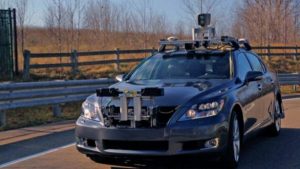 Toyota Motor Corp. is striding forward to reestablish its name as a manufacturer of safe vehicles and a forerunner in advanced, autonomous vehicle technologies. Its vehicle communication system, called ITS Connect, will go on sale in Japan this year in the Toyota Crown luxury sedan; it was unveiled on Oct. 6 during a demonstration near the Tokyo waterfront. Toyota said it will deploy autonomous driving systems by 2020 supporting vehicles talking to each other, scanning blind spots, and keeping safe distance from other cars.
Toyota Motor Corp. is striding forward to reestablish its name as a manufacturer of safe vehicles and a forerunner in advanced, autonomous vehicle technologies. Its vehicle communication system, called ITS Connect, will go on sale in Japan this year in the Toyota Crown luxury sedan; it was unveiled on Oct. 6 during a demonstration near the Tokyo waterfront. Toyota said it will deploy autonomous driving systems by 2020 supporting vehicles talking to each other, scanning blind spots, and keeping safe distance from other cars.
Toyota’s work is aimed at supporting developing technologies that could lead the auto industry’s transition to autonomous vehicles. That will come through ITS Connect, which deploys vehicle-to-infrastructure and vehicle-to-vehicle communication systems in its cars; these technologies are also described by transportation planners as “intelligent transportation systems” (ITS). Some experts believe that ITS technologies will be key components in autonomous vehicles. For now, Toyota is considered a leader in connected car technologies that will play a role in the future of autonomous vehicles.
Toyota is continuing to recover from its massive vehicle recall during 2009-2010 for “unintended acceleration,” and was part of the major recall this year with Takata airbags. In February 2011, the National Highway Traffic Safety Administration, in collaboration with NASA, released findings into the investigation on the Toyota drive-by-wire throttle system. After a 10-month study, NASA and NHTSA scientists found no electronic defect in Toyota vehicles; the crisis wasn’t over in court rooms, but the ruling helped Toyota emerge from the crisis on solid ground.
General Motors seemed to follow Toyota’s lead in 2014 with its massive recall of 39 million vehicles globally over a faulty ignition switch, bringing in outside investigators to get to the root of the problem. Analysts and commentators are encouraging Volkswagen to follow a similar ethical path in its diesel emissions scandal accountability.
Along with hydrogen fuel cell vehicles, Toyota has been investing in safety and innovative technologies that could support development of future autonomous vehicles. Toyota has been testing out its own Advanced Safety Research Vehicle – a Lexus LS used for research at the Toyota Research Institute in Ann Arbor, Mich. It uses forward-looking and side-facing millimeter-wave radar sensors, as well as a 360-degree laser scanner. Onboard computers use data from those scanners, and data collected from the engine and wheels, to collect data on the car’s surroundings, and operate the car’s controls.
Eight automakers – Toyota, Daimler, Ford, General Motors, Honda, Hyundai, Nissan, and Volkswagen – have been developing vehicle-to-vehicle communications (V2V) technology in cooperation with the federal government for several years through a group called the Crash Avoidance Metrics Partnership (CAMP). The V2V transmitters and software are expected to cost an estimated $350 per vehicle in 2020; but automakers so far have supported NHTSA’s objective.
On Aug. 18, 2014, NHTSA released an advance notice of proposed rulemaking and a supporting research report on V2V communications technology. “Safety is our top priority, and V2V technology represents the next great advance in saving lives,” said US Transportation Secretary Anthony Foxx.
The rules will give drivers early warnings of approaching danger in vehicles built after 2020. NHTSA predicts that V2V technology could prevent 25,000 to 592,000 crashes and save 49 to 1,083 lives annually when the entire US vehicle fleet has adopted the technology; that would come from adopting Left Turn Assist (LTA) and Intersection Movement Assist (IMT) applications.
The Ann Arbor test, managed by the University of Michigan Transportation Research Institute (UMTRI), is testing out several different accident-prevention approaches. The most sophisticated includes 64 cars, three buses and three trucks driven by the public and specially built by the automakers with a sampling of six safety-warning features, along with video cameras to capture traffic incidents.
On the green car front, Toyota is counting on the redesigned 2016 Prius to reestablish the Prius brand as a technology innovator. For fuel cell cars, Toyota will be displaying the Toyota FCV Plus at the Tokyo Motor Show. Toyota is counting on the 2016 Mirai to essentially become the Prius of hydrogen fuel cell cars.



